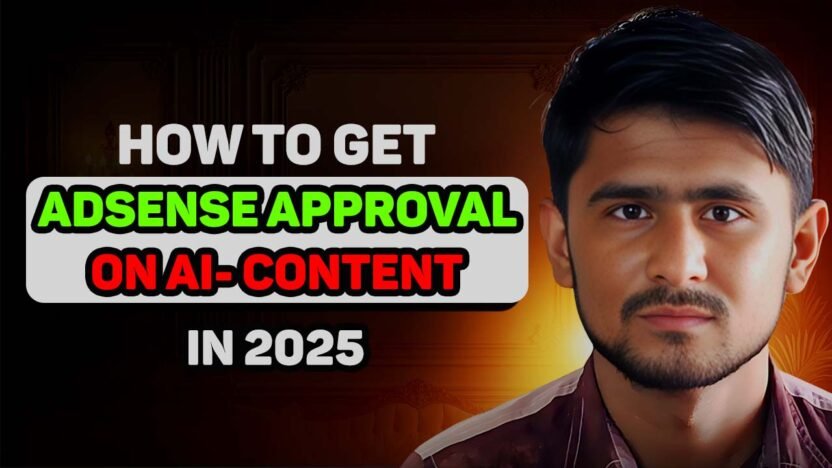Getting Google AdSense approval has become a very trending topic these days, especially among bloggers. Since the introduction of AI writing tools like ChatGPT, many people are wondering: can I earn money from AdSense through AI blog?
The good news is that Google AdSense approves AI content, but only when it meets high-quality standards. If you want success, you have to follow some specific strategies. This guide will tell you the whole process of how to make your content AdSense-friendly, so that you can write such articles which get approved and also make long-term earnings.
The Rise of AI Content in Blogging
By 2025, the digital world has changed a lot, and now AI has become an important part of content creation. Now every blogger is asking the same question: can AI content get AdSense approval? The answer is not simple, but yes, it is possible with the right approach, whether you are using ChatGPT or any other AI tool.
If you want your AI blog to earn money from AdSense, you will have to understand Google’s content quality rules and follow a value-based strategy. Getting AdSense approval for a ChatGPT blog is not difficult, if you understand that Google is not against AI. Google just wants to see whether your content is valuable to the reader or not. This means that your AI-generated blog posts should be helpful, original, and engaging — whether they are written by a human or AI.
Understanding AI-Generated Content
AI-generated content means text, articles, or blog posts written with the help of AI tools. These tools can write human-like content on any topic in seconds. Popular tools like ChatGPT, Cloud AI, Copy.ai, and Perplexity have completely changed the way of content creation.
If we talk about AdSense approval, AI content can mean an article written completely by AI, or content in which AI has provided major help – like rewriting, editing or idea generation. It is important to understand the level of AI involvement in your content for Google policy.
The most important point is this: AI content itself is not a problem, nor is it against Google policy. What matters is quality, originality and value. Many successful bloggers are earning money from AdSense through AI content, but they don’t just copy-paste. They focus on quality.
Why AI Blogging Is Trending in 2025
The trend of AI blogging has exploded in 2025 because AI tools have become very advanced now. Their quality and capability has improved so much that they create content which is useful for readers as well as perfect for AdSense. Bloggers can now write fast content, beat writer’s block, and can also write on topics about which they did not have much knowledge earlier.
Another big reason is cost-efficiency. Earlier, for high-quality blogs, writers, editors, and researchers had to be hired – which was costly. Now with the help of AI tools even a single blogger can scale the content production, that too in a low budget.
AI tools are also best in research and data analysis. This is why bloggers are able to write such articles which are deeply researched. If used correctly, content written by AI is informative as well as ready for AdSense approval.
Does Google AdSense Allow AI Content?
The most asked question is: Does Google AdSense really allow AI content? As per the current guidelines of Google, they have not imposed any ban on AI content. But they clearly say that whether the content is written by human or AI, it should be high-quality and should provide genuine value to the user.
Google’s focus is on the usefulness of the content, not who wrote it. This means that AdSense AI also evaluates content based on the E-E-A-T principles — Experience, Expertise, Authoritativeness, and Trustworthiness. If your AI content meets Google’s standards, you’re eligible.
Google’s recent policy updates have highlighted that first-hand experience and expertise are important in content. It’s not whether the AI content will automatically be rejected, but whether your content provides unique value and insight — that matters. If you write an article that’s based on personal experience or in-depth research, your chances of getting AdSense approval are quite good. And this content will also rank well in Google.
Busting Myths About AI Content and AdSense
A big myth is that Google detects and rejects every AI content. The reality is that Google’s system detects low-quality and spammy content – not every AI article. If your AI content is valuable, then your chances of getting AdSense approval are strong.
Another misconception is that you have to hide AI. The truth is that many successful bloggers openly tell that they use AI tools and still their AdSense is approved. Creating content with AI is not a problem. The problem is with useless and low-quality content. The real point is that it is important to check plagiarism and assess the quality of AI content.
Creating AdSense-Friendly AI Content
Google’s Helpful Content System mainly checks whether the content is written for people or just for the search engine. If you want AdSense approval, your content should:
- Answer real user’s question
- Solve real problem
- Share unique idea or perspective
Your content should look like it was written by an experienced human, even if it is helped by AI. The goal should be that your article is so helpful that people bookmark it, share it or recommend it. This user-centric thinking helps AI blogs get AdSense approval. Content created for clicks fails.
Google repeatedly says that their focus is on the quality and value of the content – it doesn’t matter who wrote it. This is why some AI blogs get rejected and some get approved. Whether the content is written by AI or a human – if it has original value, it will get approval.
Adding Original Value
Original value doesn’t mean that every idea should be completely new. This can happen:
- Explaining old information in a new and clear way
- Combining different perspectives in a single article
- Adding your personal experience, analysis or practical tips
You can make AI content unique if you add something to it that is not easily found elsewhere. Share your thoughts, analyze it in detail, or give practical tips based on your journey. It is important for Google that the content is valuable and the user experience is strong.
Best Practices for AI Content Creation
So what is the right way to write AI content that meets Google’s quality standards and gets AdSense approval? This can be a little tricky to understand as “low-value content” is a common reason for rejection. Let’s break it down in simple language.
Give a Human Touch
The first and most important step is to give a human touch to the AI content. The raw content written by AI is grammatically correct but lacks the personal touch and unique insights that both Google and readers like.
The secret of people who successfully get AdSense approval for their AI blogs is that they are good editors.
Start with AI, but don’t end there. Make a rough draft with an AI tool, then do heavy editing on it. Improve the structure, improve the language, and add your thoughts, experience and personal views. These are the things that make your content real and valuable.
Include personal examples, real-life stories and your analysis in every content. This makes your content pass Google’s quality check easily. Your goal should be that the content should be written by a real expert, not a machine.
Avoid Low-Quality Content
If your blog is full of low-quality, generic content, then it is difficult to get AdSense approval. Google’s algorithms easily identify such content which lacks originality and real value. Avoid content that simply rephrases other articles without adding a new perspective.
Focus on depth, not breadth. Instead of writing dozens of short superficial posts, write a few high-quality in-depth articles. This strategy is best for the long term.
Ensure Originality
It is very important to pay attention to originality while using AI tools. AI tools do not intentionally commit plagiarism, but sometimes generate content on common topics that is very similar to existing material.
Use tools like Copyscape or Grammarly to check for plagiarism so that your content is original before publishing.
But don’t just check for plagiarism – the content should be original even conceptually. Give a unique angle, combine data from different sources or present it in a new format so that it looks valuable.
Remember, fresh and original content is best for AdSense approval and also for audience trust. Use AI for assistance, but don’t be 100% dependent on it.
Optimizing Your Website for AdSense Approval
A website isn’t approved just for the content — design, speed and user experience are equally important. A professional-looking, fast-loading site signals to Google that you seriously want to provide value. Get good hosting, compress images and use a clean, mobile-friendly design.
Your site should have at least 15-20 high-quality posts before applying for AdSense. Google needs to see that you regularly publish valuable content, not just apply after adding a couple of posts. Each post should be substantial, ideally between 1500 to 3000 words.
Essential Pages
For a professional website, it is very important to have a few essential pages. Make sure to add About page, Contact page, Privacy Policy and Terms of Service page in your AI blog. On the About page, it is important to tell who you are and why people should trust your content.
Mobile Responsiveness
Mobile responsiveness cannot be ignored in 2025. Test your website on multiple devices. Is the navigation easy? Is the text readable without zooming? Many AI blogs get rejected only because of the poor user experience of their site, not because of the content.
Common Reasons for AdSense Rejection
The most common reason for rejection is thin content or lack of originality. If your content seems generic, as anyone could write, Google will not consider it to be high-quality. This happens when you publish only AI-generated text without any human editing.
If your site’s structure is confusing, AdSense may reject your content no matter how good it is. Posts should be logically organized and navigation should be clear and simple.
The biggest risk is AI spam and lack of value. AI spam means content that is written just to meet the word count, without any human touch, insights, or unique point of view. Many people create 100 articles with AI tools thinking they will get AdSense, but Google easily rejects such low-quality content. Focus on quality, not quantity.
A Personal Success Story
When I started my ChatGPT-assisted blog, I decided not to apply for AdSense without proper preparation. Luckily, my strategy worked. I dedicated 3 months to building a strong foundation.
The first month was spent only on building the website. Chose a professional and fast-loading premium theme, got reliable hosting, created all the essential pages (About, Contact, Privacy Policy) and worked on technical optimization.

The second month was focused on writing content. I used the hybrid method – created a basic draft from ChatGPT, then added my personal insights, manually edited the article and ensured unique value in it. I wrote 25 articles, each one was between 2000 to 3500 words, and covered all the important topics of the niche.
The third month was for refining and polishing. I created custom images, improved internal linking, and made the About page more personal with my journey and experience. Gave a professional touch to every small detail.
Lastly, when I rechecked all the policies of Google, I applied for AdSense. Got the approval in just 48 hours.
Lessons Learned
The biggest mistake people make is applying in a hurry. They apply as soon as they create a website, but if your site is not ready then rejection is certain. The second big mistake is publishing AI content without any human touch. I got the best result when I used AI as a base and added my real experience to it.
Final Thoughts on AI Content and AdSense in 2025
If you are wondering if AI content can get AdSense approval in 2025, the simple answer is yes. But for success, you will have to understand that Google’s focus is not on tools, but on the quality of the content and user value. Use AI as an assistant, not as a replacement for human creativity and expertise.
You will have to take a complete approach for AdSense approval. The technical setup should be right, the AI-assisted content should be high-quality and your focus should be on solving the real problems of readers. If you follow the steps in this guide, you can successfully monetize your AI blog with Google AdSense.
Remember, earning money from AI blog is not a way to find shortcuts or cheat the system. It is a way to create better, detailed and valuable content by using a powerful tool correctly.
You should definitely use AI – not using it in today’s era would be a mistake because it saves time and makes boring tasks easy. But don’t be 100% dependent on it. Add your human touch, work hard, and always focus on providing real value to the readers. Keep quality above quantity and you will surely achieve success.





